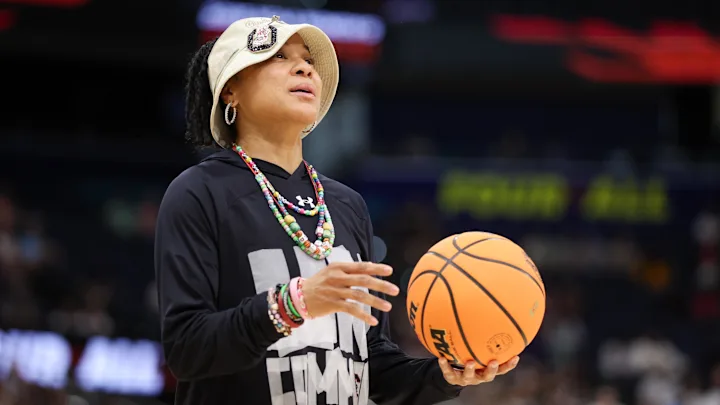
The South Carolina Gamecocks are set to honor head coach Dawn Staley with a statue, a monumental gesture recognizing the transformative impact she has had on the program, the university, and women’s college basketball as a whole. Staley, who has been at the helm of the Gamecocks since 2008, has not only transformed South Carolina into a powerhouse in the sport but has also helped elevate the profile of women’s basketball nationally. The statue is a fitting tribute to her decades-long dedication, both as a player and as a coach, and is a testament to her legacy in the sport.
The Rise of Dawn Staley: From Player to Coach
Dawn Staley’s journey to becoming one of the most respected figures in basketball began long before her coaching tenure at South Carolina. Born on May 4, 1970, in Philadelphia, Staley was a basketball prodigy, playing for the University of Virginia from 1989 to 1992. As a standout point guard for the Cavaliers, Staley earned numerous accolades, including three All-American honors and the Naismith College Player of the Year award in 1991. Her leadership on the court was unmatched, and her ability to elevate her team to national prominence was evident as Virginia made consistent appearances in the NCAA Tournament during her tenure.
After college, Staley’s success continued on the international stage, where she became a staple of the United States women’s national basketball team. Her contributions to the team helped the U.S. win three Olympic gold medals (1996, 2000, 2004). Additionally, Staley’s career in the WNBA further solidified her place among the game’s greats. She played for several teams, including the Charlotte Sting, Houston Comets, and Phoenix Mercury, earning multiple All-Star selections.
However, it was Staley’s transition to coaching that truly shaped her legacy. After a successful playing career, Staley moved into coaching, first as an assistant coach with the Philadelphia Rage of the American Basketball League and later as the head coach of Temple University. There, she quickly proved that her leadership and strategic acumen went beyond her playing days. At Temple, she led the Owls to the NCAA Tournament multiple times and built a reputation as a coach who could develop players and consistently compete at a high level.
In 2008, Staley was hired as the head coach of the South Carolina Gamecocks. At the time, South Carolina’s women’s basketball program was not considered a national powerhouse. However, Staley quickly made it her mission to change that perception.
Building a National Power at South Carolina
When Staley arrived in Columbia, South Carolina, the women’s basketball program was in the midst of a rebuilding phase. The team had a solid foundation, but they lacked the national recognition that some of the top programs in the country enjoyed. Staley, however, brought with her a passion, a vision, and an unparalleled work ethic that would soon lay the groundwork for one of the most successful eras in the program’s history.
The early years of Staley’s tenure were focused on recruitment and establishing a culture of excellence. She recruited high-level talent, not just from South Carolina, but from all over the country. Her ability to identify and develop talent was evident in the players she brought in, including names like A’ja Wilson, Alaina Coates, and Tiffany Mitchell. Under Staley’s leadership, the Gamecocks became a consistent contender in the Southeastern Conference (SEC), one of the most competitive leagues in women’s college basketball.
Staley’s approach was not just about recruiting talent, though. She instilled a sense of discipline, resilience, and teamwork within the program. Her emphasis on defense and her ability to adapt to different styles of play made the Gamecocks a difficult team to beat. Over time, Staley’s vision began to come to life, and South Carolina evolved into a national contender.
In 2015, Staley’s efforts culminated in a breakthrough season when the Gamecocks won their first-ever NCAA championship. The team defeated the University of Notre Dame in the championship game, with a strong performance led by A’ja Wilson, who was named the Most Outstanding Player of the Final Four. This victory was not only a testament to the program’s growth under Staley’s leadership but also a defining moment for women’s basketball in South Carolina and nationwide.
The Legacy of Dawn Staley
Dawn Staley’s influence extends far beyond her successes on the court. Under her leadership, South Carolina has become a model for excellence in women’s college basketball, earning national recognition for its culture, competitive spirit, and commitment to academic and athletic success. Staley’s ability to develop players both on and off the court has made her one of the most respected figures in the game.
Staley’s impact is perhaps most evident in the success of her players. Her leadership style is often described as player-centric, as she takes a hands-on approach to mentoring her athletes, helping them grow as basketball players and as individuals. Many of Staley’s former players have gone on to have successful careers in the WNBA, including A’ja Wilson, who was selected as the first overall pick in the 2018 WNBA Draft. Wilson, who won the WNBA MVP in 2020, credits Staley for her development as a player, often referring to her as a mentor and guiding figure in her life.
In addition to her success on the court, Staley has been an outspoken advocate for gender equity in sports, particularly in women’s basketball. She has used her platform to fight for better opportunities for women in athletics, including equitable pay, access to facilities, and visibility for women’s sports. Her advocacy has helped elevate the profile of women’s basketball and provided a voice for the next generation of female athletes.
Staley’s influence is not limited to the basketball court. She has become a symbol of empowerment for women and people of color, proving that excellence and leadership are not confined to any one demographic. Her journey from Philadelphia to the pinnacle of women’s college basketball is a testament to the power of determination, hard work, and vision. She has shown that with the right leadership, any program—no matter the starting point—can rise to the top.
The Statue: A Fitting Tribute
The decision to honor Dawn Staley with a statue is a fitting tribute to her contributions to South Carolina and women’s basketball. Statues have long been a way to commemorate figures whose impact transcends their specific fields, and Staley’s impact on the Gamecocks and the broader basketball community is undeniable. A statue not only symbolizes the success she has brought to the program but also serves as a lasting reminder of the legacy she continues to build.
The statue, set to be placed outside Colonial Life Arena, where the Gamecocks play their home games, will be a focal point for fans, players, and recruits alike. It will stand as a beacon of excellence and a tribute to the program’s growth and success under Staley’s leadership. For those who have followed the Gamecocks over the years, it will be a symbol of the journey the program has taken—from an underdog team to one of the most dominant forces in women’s college basketball.
The statue will also serve as a powerful symbol for future generations of female athletes. It is a recognition not just of Staley’s coaching ability but of the path she has paved for women in sports. Staley’s leadership, commitment to social justice, and dedication to her players have made her an icon for women’s basketball, and her statue will stand as a reminder of the impact that one individual can have on an entire program, university, and community.
The unveiling of Dawn Staley’s statue is a momentous occasion, celebrating her extraordinary legacy as a coach, player, and leader in women’s sports. Through her vision, dedication, and unwavering belief in her players, Staley has transformed the South Carolina Gamecocks into one of the most successful programs in women’s college basketball. This statue will not only honor her incredible achievements but also inspire future generations of young athletes, particularly women, to believe in themselves and their potential. Dawn Staley’s statue is more than just a piece of art; it is a symbol of excellence, perseverance, and the power of sport to change lives.





